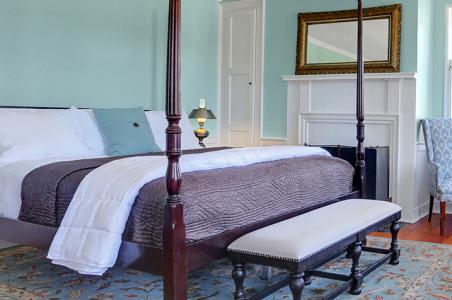March is Women's History Month and is set aside to honor women's contributions to American history. Mary Hays McCauley, also known as Molly Pitcher, is perhaps one of Cumberland Valley’s most famous women. Below we commemorate the vital role these equally important but often overlooked women played in Cumberland Valley's rich history.
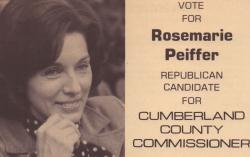 Rosemarie Peiffer & Evelyn G. Sharp
Rosemarie Peiffer & Evelyn G. Sharp
The Peiffer Memorial Arboretum and Nature Preserve, in Lower Allen Township and New Cumberland, is dedicated to the memory of Rosemarie Peiffer, the first female Cumberland County Commissioner, and her husband, Howard. Rosemarie was raised on a farm in Schuylkill County and was a licensed registered nurse. She developed an interest in politics and was elected to the New Cumberland Borough Council before being elected as a county commissioner in 1979. Rosemarie and Howard were strong advocates of land preservation. The arboretum and nature preserve consist of 35 wooded acres with nature trails and some of the largest trees in the state.
The arboretum and nature preserve also honor the memory of aviatrix Evelyn G. Sharp, from Nebraska, who received her first commercial pilot’s license at 18 and became an airplane instructor at the age of 20. She was one of the original Women’s Auxiliary Ferrying Squadron pilots and served until April 3, 1944, when the P-38 Lightning she was piloting lost an engine on takeoff from what is now Capital City Airport and crashed into the land now owned by the arboretum, saving the lives of countless civilians by choosing an uninhabited location. Only 24 years old at the time of her death, she was a squadron commander and only three flights from her fifth rating, the highest certificate then available to women. Her fellow aviators, some of the best fliers in the country, raised money to pay for her coffin to be returned to Nebraska. Whistlestop Bookshop in Carlisle carries the only biography of her, Sharpie: The Life Story of Evelyn Sharp, Nebraska's Aviatrix by Diane Ruth Armour Bartels (1996).
Though not currently open to the public, the arboretum is available for educational purposes, meetings, special events, and weddings.
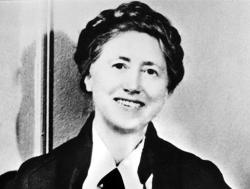 Marianne Moore
Marianne Moore
Poet Marianne Moore was born in Missouri, eventually moving to Carlisle with her mother and older brothers in 1896. After graduating from Bryn Mawr College, Moore returned to Carlisle, where she taught business subjects at the Carlisle Indian Industrial School from 1911 to 1914. Her first professionally published poems appeared in the spring of 1915, and in 1916, she moved with her mother to New Jersey. After a distinguished career as an eminent poet, author, essayist, and teacher, including the Pulitzer Prize for Literature and the Bollingen Prize in Poetry, she died in 1971, and her ashes were interred at the family’s burial plot at Evergreen Cemetery in Gettysburg. A state historical marker was dedicated to Moore in 2002 and is located at 343 N. Hanover Street in Carlisle.
 Irving Female College
Irving Female College
Irving Female College was chartered in 1856 by Mechanicsburg businessman Solomon Gorgas, who named the college after author Washington Irving. It was the first women’s college in Pennsylvania to grant degrees in arts and sciences. In 1895, the college changed its name to Irving College and Conservatory for Music. Two noted graduates of the school are Ida Kast, Class of 1892, who became the first woman admitted to the practice of law in Cumberland County, and Mechanicsburg native Jane Deeter Rippin, Class of 1902, who became national executive director of the Girl Scouts and introduced the sale of Girl Scout cookies, With increasing competition and limited financial resources, the college closed in 1929. A state historical marker at the college site can be found at E. Main Street (PA 641) near Filbert Street in Mechanicsburg.
Until recently, the five higher education institutions located in Cumberland Valley – Dickinson College, Messiah University, Shippensburg University, Central Penn College, and Penn State Dickinson School of Law – were all headed by women. Currently, three of five are headed by women.
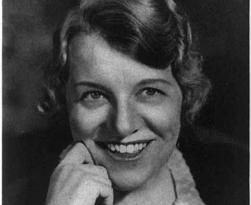 Emma Bugbee
Emma Bugbee
Emma Bugbee was born in Shippensburg on May 18, 1888. She attended Barnard College in New York and taught Greek courses at a high school in Methuen, Massachusetts. In 1911, at the age of 23, she began working as a reporter for the New York Herald and the New York Herald Tribune. In 1914, she covered the Women’s Suffrage walk from Manhattan to Albany in New York. In 1922, Emma became one of the founders of the newspaper called the Women’s Club. She eventually became a women’s suffragist and was well known for her coverage of First Lady Eleanor Roosevelt. In fact, Emma became friends with Eleanor and other Women’s Rights Suffrage advocates. In 1936, she published the first series of five “Peggy” books to inspire a generation of female reporters who entered journalism. She died on October 6, 1981, in Warwick, Rhode Island. (Source: Shippensburg Historical Society)
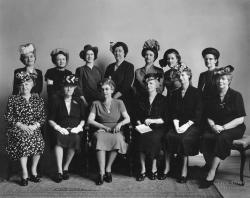 Helen H. Stevens
Helen H. Stevens
Born in Chicago on September 18, 1902, Helen Stevens was a long-time and very active member of the Carlisle community whose life work was associated with finding assistance for individuals needing mental health services. She was deemed "the grandmother of mental health services in Carlisle." Helen lived in Chicago during a period of active social reform, including the establishment and growth of Hull House. She was certainly aware of Jane Addams and other activist women involved with welfare causes. Many of these women were students and alumni of the University of Chicago, Helen's own alma mater. She graduated in 1925 with dual degrees in English and Social Science. Following graduation, she worked as a statistician for the university, compiling information on the mental health care provided in Chicago for a publication.
In 1926, Helen married Allen J. Stevens, a resident of Carlisle, Pennsylvania. Helen became involved with various organizations in Carlisle, joining the Carlisle Civic Club in 1927. She served on that organization's Welfare Committee. The committee became the Welfare Association and then Children and Family Services. As "her" agency continued to develop, becoming the Family Guidance Clinic and then the Carlisle Counseling Service in 1977, Helen maintained her high level of interest and involvement. In 1979, the organization was named the Helen H. Stevens Community Mental Health Center in recognition of her great influence; the name has since been abbreviated to "the Stevens Center." Helen served as the unpaid director from 1957 through 1967. During the 1970s, Helen Stevens served on the first committee formed as the Tri-County Mental Health Board for Cumberland, Perry, and Dauphin Counties.
Helen passed away on April 21, 1994, at the age of 91. She spent sixty-eight years seeking to help those in need find the resources for assistance. When he was CEO of the Stevens Center, Charles Currie stated, "We were taken with her first-hand knowledge of mental health and how well she articulated the needs of her clients. She recognized the role that volunteers could play in mainstreaming the mentally ill individual back into the community after institutionalization." (Source: Cumberland County Historical Society; https://gardnerlibrary.org/encyclopedia/helen-h-stevens-1902-1994; image also from the Cumberland County Historical Society Gardner Digital Library; Helen H. Stevens is in the back row, third from the left)
 SSGT Kimberly Fahnestock Voelz
SSGT Kimberly Fahnestock Voelz
SSGT Kimberly Fahnestock Voelz, from Carlisle and a graduate of Trinity High School, became the first female soldier from Pennsylvania to be killed in combat in Operation Iraqi Freedom. She was the only woman in her unit, serving alongside her husband, Max Voelz. Her job was to defuse bombs. While serving in Iraq in December 2003, a bomb she was trying to disable exploded. She was 27 years old. In recognition of her courage, Lower Allen Township VFW Post 7530 decided unanimously to rename its building after this exceptional soldier. A display inside the building will tell her story. This is believed to be one of the first VFWs in the country named for a service member who was killed in action post-9/11. (Source: ABC27 News, https://www.abc27.com/news/local/local-vfw-to-be-renamed-for-fallen-female-soldier)
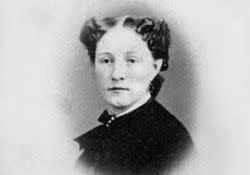 Amelia S. Givin
Amelia S. Givin
One of five children born to Robert and Sarah Givin, Amelia Givin was the only daughter. Her father and his brother founded the successful Mount Holly Paper Company in Mt. Holly Springs in the mid-19th century. Her older brothers preceded her in death, and Amelia inherited the company and became heir to the family fortune in 1879. A successful businesswoman, traveler, and philanthropist, she established Cumberland County's first free public library for the residents of this small town in southcentral Pennslyvania. Dedicated in 1890, the Amelia S. Givin Public Library was designed by renowned Pittsburgh architect James T. Steen in the Richardsonian Romanesque Revival style. The massive 60' x 30' stone structure contains brownstone that came from the nearby Hummelstown Brownstone Quarry. The interior woodwork is credited to Moses Ransom, an Ohio artisan who reinterpreted Victorian ornamentation to create "Moorish fretwork." Upon completion, Amelia Givin fully furnished and stocked the building with books and periodicals. The Amelia S. Givin Library was added to the National Register of Historic Places in 2004. The Cumberland County Historical Society recognized the library on its Cumberland County Register of Historic Places in 2022. Today, the library continues to serve the community, and visitors can still see and appreciate much of the stunning architecture. (Source: Our Towns Civic Foundation, https://www.ourtownsfoundation.org/a-remarkable-woman-builds-a-remarkable-library; and Cumberland County Library System, https://www.cumberlandcountylibraries.org/AME_About)


